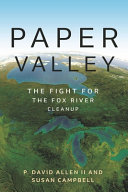

Most ebook files are in PDF format, so you can easily read them using various software such as Foxit Reader or directly on the Google Chrome browser.
Some ebook files are released by publishers in other formats such as .awz, .mobi, .epub, .fb2, etc. You may need to install specific software to read these formats on mobile/PC, such as Calibre.
Please read the tutorial at this link: https://ebookbell.com/faq
We offer FREE conversion to the popular formats you request; however, this may take some time. Therefore, right after payment, please email us, and we will try to provide the service as quickly as possible.
For some exceptional file formats or broken links (if any), please refrain from opening any disputes. Instead, email us first, and we will try to assist within a maximum of 6 hours.
EbookBell Team

5.0
40 reviewsBooklist raves, Paper Valley "is a compelling human-interest tale on par with Erin Brockovich and Jonathan Harr's A Civil Action."
When government scientist David Allen arrived at his new jobsite in the 1990s, the Fox River near Wisconsin's Green Bay was dominated by hulking paper mills, noxious industrial odors, and widespread ecological damage. Confronted by his lack of resources to force the politically powerful "Paper Valley" polluters to fix their mess, Allen proceeds against all bureaucratic odds in building a $1 billion case against the paper company bosses. Two small but vital players, Allen along with journalist Susan Campbell were relentless in bringing the case to the public at the time. They do so again in this book: an act of radical transparency to uncover the intrigue that nearly blocked the cleanup behind the scenes at US Fish and Wildlife, Wisconsin's Department of Natural Resources, and the US Environmental Protection Agency. In a rare and major environmental win, the Fox River became the site of the largest polychlorinated biphenyls cleanup in history, paid for by the paper companies rather than taxpayers, to the tune of $1.3 billion, and completed in 2020.
This true story of struggle, perseverance, and success inspires hope for environmentalists who strive to restore natural landscapes. The detailed account given in this book is meant to inspire and offer practical knowledge and solutions for those fighting similar opponents of environmental cleanup and restoration. Allen and Campbell eloquently outline the problematic bureaucracy involved in environmental cleanup efforts and reveal tactics to compel corporate entities who would dodge accountability for decades worth of contamination.